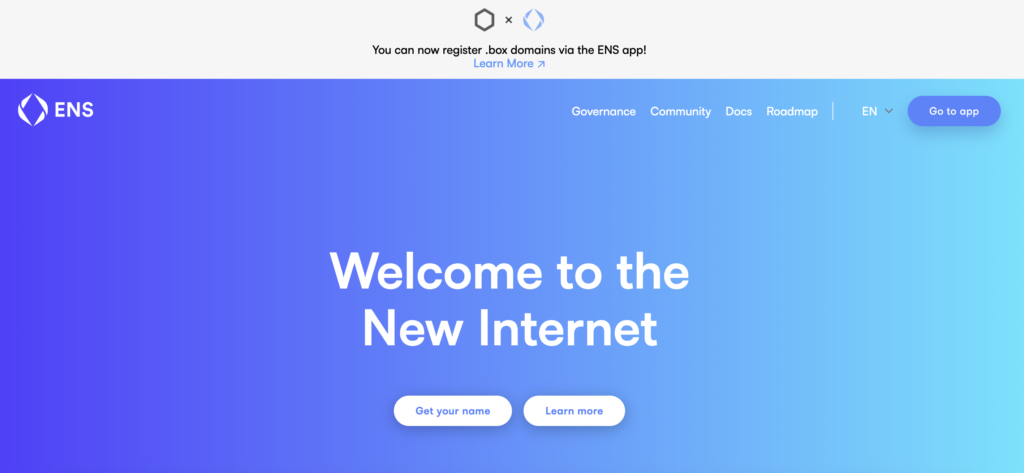In this article, we delve into the Ethereum Name Service (ENS) and its associated cryptocurrency, ENS. As a pivotal component of the decentralized web, ENS transforms the way we interact with blockchain technology by offering a user-friendly approach to managing blockchain addresses. We’ll explore the intricate facets of ENS, examining its structural and technological underpinnings, its economic model, and the expansive ecosystem it supports. Moreover, we’ll discuss the growth prospects of ENS and provide a forecast for its future development within the evolving landscape of decentralized technologies.

What is Ethereum Name Service (ENS)?
The Ethereum Name Service (ENS) is a decentralized, open-source system designed to map human-readable domain names to machine-readable identifiers such as Ethereum addresses, content hashes, and metadata. ENS leverages the Ethereum blockchain to provide a secure and censorship-resistant name resolution service, similar to the traditional Domain Name System (DNS) but with enhanced decentralization and immutability features. By translating complex blockchain addresses into simple, readable names, ENS simplifies the user experience in the blockchain ecosystem, facilitating easier transactions, asset transfers, and interactions with decentralized applications (dApps).
History of Ethereum Name Service
The Ethereum Name Service was launched in May 2017 as a key component of the Ethereum ecosystem’s infrastructure. It was developed to address the usability issues associated with long and complicated Ethereum addresses. Since its inception, ENS has undergone several significant developments:
- 2017: ENS launched on the Ethereum mainnet, introducing a bid-based auction system for domain name registration.
- 2019: ENS migrated to an updated system featuring shorter and more intuitive domain names (e.g., “.eth”), improving usability and accessibility.
- 2020: Integration with various decentralized applications and wallets expanded, enhancing ENS’s utility across the Ethereum ecosystem.
- 2021: ENS introduced support for multi-coin addresses and cross-chain interoperability, allowing users to manage addresses from multiple blockchain networks under a single ENS domain.
- 2022: The governance of ENS transitioned to a decentralized autonomous organization (DAO), empowering the community to participate in the decision-making process for future developments.
These milestones reflect ENS’s ongoing commitment to improving the usability and functionality of the decentralized web, ensuring that users can seamlessly navigate and interact within the blockchain space.
How Ethereum Name Service (ENS) Works
Ethereum Name Service (ENS) operates on the Ethereum blockchain, utilizing smart contracts to facilitate the mapping of human-readable names to machine-readable addresses and other data. ENS leverages several key technologies and concepts to deliver its decentralized naming service.
Core Technologies
ENS is built upon the Ethereum blockchain, employing its robust and secure infrastructure to ensure the integrity and immutability of name records. The primary technologies underpinning ENS include:
- Smart Contracts: ENS smart contracts handle the registration, resolution, and management of domain names. The core contracts include the ENS registry, which maintains the list of all domains and their associated data, and resolvers, which translate domain names into addresses or other resources.
- Decentralized Storage: ENS integrates with decentralized storage solutions such as IPFS (InterPlanetary File System) to store metadata and content associated with domain names, ensuring data availability and resistance to censorship.
Differentiation from Traditional DNS
ENS differs from traditional Domain Name System (DNS) in several fundamental ways:
- Decentralization: Unlike DNS, which relies on a centralized hierarchy of servers, ENS is fully decentralized, with records maintained on the Ethereum blockchain. This eliminates single points of failure and enhances security.
- Immutable Records: ENS entries are stored on the blockchain, making them immutable and resistant to tampering or censorship.
- User Ownership: ENS domains are controlled by their owners through private keys, granting users full ownership and control over their domain names.
Blockchain and Consensus Mechanism
ENS operates on the Ethereum blockchain, which employs a Proof of Stake (PoS) consensus mechanism known as Ethereum 2.0. This consensus algorithm ensures that transactions and changes to the ENS registry are validated by network validators, who are incentivized to act honestly through a staking and reward system.
Technical details of Ethereum’s PoS include:
- Staking: Validators lock up a certain amount of ETH as collateral to participate in the consensus process. This stake acts as a security deposit, deterring malicious behavior.
- Block Proposal and Validation: Validators are randomly selected to propose new blocks and attest to the validity of proposed blocks. This process is energy-efficient compared to the Proof of Work (PoW) mechanism.
- Finality: Ethereum 2.0 achieves finality through the Casper FFG (Friendly Finality Gadget), which ensures that once a block is finalized, it cannot be reverted, providing strong security guarantees for ENS operations.
By leveraging the Ethereum blockchain and its PoS consensus mechanism, ENS provides a secure, decentralized, and efficient naming service that is integral to the functionality and usability of the decentralized web.
Tokenomics of Ethereum Name Service (ENS)
Is ENS a Token or a Coin?
ENS is a token, specifically an ERC-20 token, which operates on the Ethereum blockchain. Unlike coins, which have their own independent blockchains, tokens are built on existing blockchain platforms and utilize their infrastructure for transactions and security.
Tokenomics Overview
The ENS token serves multiple functions within the Ethereum Name Service ecosystem. It is primarily used for governance, enabling token holders to participate in the decision-making processes of the ENS DAO (Decentralized Autonomous Organization). This governance model allows the community to vote on proposals and influence the development and future direction of ENS.
Emission Model
ENS tokens were initially distributed through an airdrop to users who had registered ENS domain names before a specific cutoff date. The distribution was designed to reward early adopters and active participants in the ENS ecosystem. The total supply of ENS tokens is capped, ensuring scarcity and potentially enhancing their value over time.
Token Utility and Governance
ENS tokens are integral to the governance of the ENS ecosystem. Token holders can propose and vote on changes to the ENS protocol, funding for new projects, and other key decisions. This decentralized governance structure ensures that the community has a direct say in the evolution of the service.
Market Performance
Since its introduction, the value of the ENS token has exhibited significant volatility, reflective of broader market trends in the cryptocurrency space. Its price is influenced by factors such as overall market conditions, adoption rates of ENS domains, and developments within the ENS ecosystem.
Distribution and Allocation
The initial allocation of ENS tokens was designed to balance rewarding early adopters and funding future development. A portion of the tokens was reserved for the ENS DAO to ensure the sustainability of the project, covering operational costs and funding initiatives to drive growth and innovation.
Staking and Incentives
While the primary function of the ENS token is governance, there are discussions within the community about introducing staking mechanisms. Such mechanisms could potentially reward token holders for locking up their tokens, providing additional incentives for participation and aligning long-term interests with the success of the ENS ecosystem.
The tokenomics of ENS reflect a well-thought-out approach to building a sustainable and community-driven project. By aligning incentives with the interests of its users and leveraging the robust infrastructure of the Ethereum blockchain, ENS aims to create a resilient and adaptive naming service for the decentralized web.
Where to Buy ENS Cryptocurrency
ENS tokens can be purchased on several major cryptocurrency exchanges. Below is a list of exchanges where ENS is actively traded:
- Binance: One of the largest and most popular cryptocurrency exchanges globally, Binance offers high liquidity and a wide range of trading pairs for ENS tokens.
- HTX (formerly Huobi): A leading global exchange known for its robust security measures and diverse cryptocurrency offerings, HTX supports ENS trading.
- MEXC: This exchange provides a user-friendly interface and competitive trading fees, making it an attractive option for buying ENS tokens.
- Bybit: Known for its advanced trading features and reliable platform, Bybit is another exchange where ENS tokens can be purchased.
- KuCoin: Often referred to as the “people’s exchange,” KuCoin offers a broad selection of cryptocurrencies, including ENS, and supports various trading options.
These exchanges provide a range of features and trading pairs, allowing users to acquire ENS tokens through various methods, including spot trading, limit orders, and market orders.
Where to Store ENS Tokens
Storing ENS tokens securely is crucial for safeguarding your assets. Here are some recommended wallets that support ENS tokens:
- MetaMask: A popular Ethereum wallet that can be used as a browser extension or mobile app. MetaMask allows users to manage their ENS tokens, interact with decentralized applications (dApps), and store other ERC-20 tokens.
- Ledger Nano S/X: Hardware wallets known for their high security, Ledger devices support ENS tokens and provide offline storage, significantly reducing the risk of hacks.
- Trust Wallet: A mobile wallet that supports a wide range of cryptocurrencies, including ENS. Trust Wallet is user-friendly and integrates seamlessly with various dApps.
- MyEtherWallet (MEW): A web-based wallet that offers full control over private keys and supports ENS tokens. MEW provides an intuitive interface for managing and storing Ethereum-based assets.
- Trezor: Another reputable hardware wallet, Trezor offers robust security features and supports ENS tokens along with a wide range of other cryptocurrencies.
These wallets provide various options for securely storing ENS tokens, ranging from hardware wallets for maximum security to software wallets for ease of use and accessibility. Each wallet offers unique features that cater to different user preferences and security needs.
Project Prospects
The growth of the Ethereum Name Service (ENS) project is underpinned by several key factors. As the adoption of decentralized technologies and blockchain solutions continues to rise, the demand for user-friendly interfaces like ENS increases. ENS addresses a critical need by simplifying the interaction with complex Ethereum addresses, making it easier for users to engage with the blockchain ecosystem.
Customer Base and Partnerships
ENS primarily serves users within the Ethereum ecosystem, including developers, businesses, and individual cryptocurrency holders who require a streamlined method to manage and share their blockchain addresses. By providing human-readable names, ENS enhances the usability of decentralized applications (dApps), wallets, and other blockchain-based services.
Significant partners and integrations include:
- MetaMask: Integration with this widely-used Ethereum wallet enhances accessibility for users managing their ENS domains.
- Uniswap: Integration with one of the leading decentralized exchanges, allowing users to utilize ENS domains within the trading platform.
- Opensea: Partnership with the largest NFT marketplace enables users to associate their ENS domains with digital assets and collections.
These partnerships not only broaden the reach of ENS but also embed its functionality into key components of the Ethereum ecosystem, driving further adoption and usage.
Ecosystem Overview
The ENS ecosystem is continually expanding, with a diverse array of applications and services leveraging its naming system. Key components of the ENS ecosystem include:
- Wallets: ENS is supported by a wide range of wallets, including MetaMask, Trust Wallet, and Ledger, providing users with secure and convenient storage options.
- Decentralized Exchanges (DEXs): Platforms like Uniswap and SushiSwap integrate ENS, allowing users to trade cryptocurrencies using human-readable names.
- NFT Marketplaces: Opensea and other NFT platforms support ENS domains, enabling users to link their digital identities with their NFT collections.
Growth Forecast
The future development of ENS is expected to follow the broader trends in the blockchain and cryptocurrency markets. As decentralized finance (DeFi) and non-fungible tokens (NFTs) continue to gain traction, the utility of ENS domains is likely to expand. Additionally, the ongoing integration of ENS with various blockchain projects and platforms will further solidify its role as a crucial infrastructure component.
Innovations such as multi-chain support and enhanced domain management features will also contribute to the project’s growth. As ENS evolves, it is poised to play a pivotal role in the mainstream adoption of blockchain technology by making it more accessible and user-friendly.
Conclusion
The Ethereum Name Service represents a significant advancement in the usability and functionality of blockchain interactions. As the ecosystem continues to mature, ENS stands out as a critical infrastructure component, facilitating seamless and intuitive access to decentralized networks. The continued development and adoption of ENS will undoubtedly play a crucial role in shaping the future of decentralized applications and the broader blockchain space.






